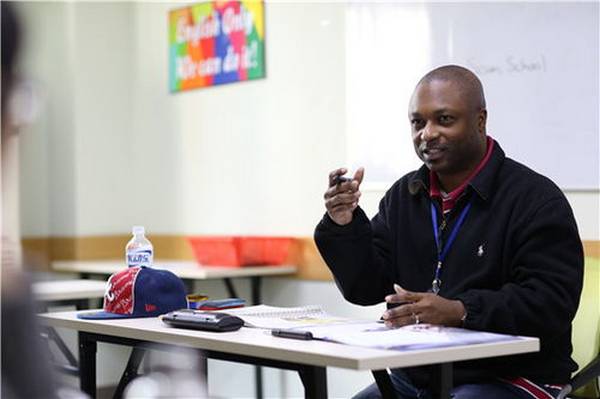Actually speaking a foreign language fluently takes a lot of hard work and practice. Even if you study every day, it can take years to master some languages. Meanwhile, you start to get frustrated at your lack of progress and you want to give up。
究竟上讲一门流畅的外语必要不少的辛劳尽力和实践。即便你天天进修,把握某一门说话也要花数年的时候。与此同时,你起头因前进缓慢而变得懊丧,你想抛却了。
Don’t
万万不要!
There are all kinds of rewards associated with speaking a second language. Not just intangible rewards, like being able to chat with locals when you travel, but psychological and health rewards as well. Studies show that being able to speak a second language may help you multitask and prevent dementia。
讲第二门说话,有各类各样的回报。不但仅是无形的回报,好比观光时你可以或许与本地人交换,并且另有生理和康健方面的回报。钻研表白,能说第二门说话可以帮忙你培育同心专心多用和预防老年痴呆。
So if you want to reap all of the benefits of speaking a second language, how can you continue working on your language skills without getting burnt out? Here are 6 tips to simplify your language learning。
以是若是想收成说第二外语的各种益处,在你抓狂之前,在说话技术练习上你要怎么继续尽力?这里有6个技能可以简化你的说话进修。
1. Have a Word of the Day。
本日一词
Trying to learn everything at once and getting overwhelmed by the sheer number of words in your new language can be overwhelming. Sometimes, even if you do learn new words, you forget them quickly because you haven’t heard them enough in context。
顿时着手进修和面临进修新说话的大量辞汇要经受的庞大压力,这真的让人感触手足无措。有时辰,即便你确切学到了新单词,你很快就会健忘它们,由于你在语境入耳得还不敷多。
One way to get around this problem is to keep a few new words in your vocabulary by using them on a daily basis. Since it takes an adult an average of 150 times to learn to use a new word properly, having a Word of the Day or several words can help build your vocabulary。
一种解决这种问题的法子是经由过程天天利用新辞汇来影象它们。成年人均匀要150次才学会公道地利用一个新词,一天学一个或几个新词可以帮忙你堆集辞汇量。
You can do this one of two ways. One, you can keep a running list of words you’d like to learn and designate one to be the word of the day. Or, two, you can wait for new words to come up organically in conversation, and then try to use the new word several times。
有两种法子可以做到。一是把你想学的单词做成单词列表,并指定一个单词为“本日一词”。另外一种是你可以等待呈现在谈话里的新单词,然后试着用上几回新单词。
2. Speak the language as much as you can (especially with native speakers)。
尽量多地讲这类说话(出格是与母语人士)
It goes without saying that the best way to learn how to speak a language is to actually speak it. Reading and studying gra妹妹ar books will only get you so far。
不消说,进修若何说一门说话的最佳方法是说这门说话。浏览和进修语法只会让你阔别说话的本色。
And yet, it’s so easy to get trapped in the “not-good-enough” mindset, where you don’t speak because you think you don’t speak well enough. And then your speaking doesn’t get better。
除此以外,你还很轻易陷进“不敷好”的生理模式,有了这类生理以后你就不会启齿说,由于你认为本身讲得不敷好。因而你的白话就得不到晋升。
So make an effort to co妹妹unicate with native speakers of your language. You’ll learn a lot more in a 5 minute conversation with a native Spanish speaker than you will from another English 
speaker who’s had 2 years of college Spanish. Try to spend 80% of your time speaking with those who speak the language better than you。
以是尽力与你所学英语的母语人士交换。与本土西班牙人聊5分钟对话,比起和那些来自英语国度在大学里学了两年的西班牙语的人交换,你学到的会更多。试着把80%的时候花在和比你讲得好的人扳谈。
3. Listen to foreign language radio or TV, even as background noise。
听外语之声或看外语电视,即便是作为布景音也好。
Part of learning to speak a foreign language properly is learning the intonations and rhythms of the words. In French, for example, you can’t put the emphasis on different words in a sentence to vary what you mean (like you can do in English). And it’s easy to distinguish beginner students from near-native speakers by listening for the ones who pronounce French like it’s English。
准确地进修讲外语,此中一部门是进修语和谐单词的节奏。比方在法语里,你不克不及和进修英语同样,把重点放在句子里的分歧单词上来扭转你的意思。并且低级进修者和本土母语人士很轻易区分隔来,由于有些人的法语是英语情势的。
The remedy 
to that is to listen to the language as much as possible。
解救的法子是尽量地多听。
Try to hear the pacing of the words, how they’re pronounced in different contexts, and what the different intonations are. How does the language sound when the speaker is excited, or angry, or asking an accusatory question? Even listening to the language in the background will help you to pick up information on how the language is spoken。
试着听话语的速率,它们在分歧的语境中是若何发音的,又有哪些分歧的腔调。当措辞人愉快、或愤慨、或是责怪时,说话又会是怎样样的呢?即便是听看成布景音的说话,也会帮忙你感知到说话的特色。
4. Look up words you don’t know in a monolingual dictionary。
在单语辞书里查找你不熟悉的词
Figuring out the meaning of words can be tricky in a foreign language, since direct and accurate translations don’t always exist. While getting the word for physical objects, like milk or desk, might be straightforward, translating concepts can be a lot harder。
对付一门外语,找出单词意义多是件辣手的事,由于直接和正确的翻译其实不老是存在。用直观物体对应这个词,如牛奶或书桌,可能简略了然,但翻译观点是难上加难。
By looking words up in a monolingual dictionary, you can make sure that the word or phrase you choose actually means what you think it does。
经由过程在单语辞书里查找单词,你能包管你选择的单词或短语现实上表达了你想的意思。
5. When you make a mistake, i妹妹ediately try to correct yourself。
当你犯了毛病时,试着当即改正本身。
Lifehack recently published an article stating that if you mistype a word, you should delete the whole word before retyping it correctly to reprogram your brain to do it properly the next time. The same goes for learning a language。
Lifehack上近来颁发了一篇文章,文章指出若是你打错了一个字,在重打以前你应当删除全部词,如许下次你才准确。对付进修一门说话是一样事理。
If you misspeak, and catch your mistake, i妹妹ediately correct yourself by repeating the sentence correctly. It will help you program your brain to avoid making the same mistake again, and solidify the gra妹妹ar rules in your mind。
若是你说错了,逮住你的毛病,当即改正本身的毛病,把这个句子准确地再说一遍。它将帮忙你的大脑防止再犯一样的毛病,并将语律例则扎根在你的脑海里。
6. Carry around a notebook and write down new words you learn。
随身携带一个条记本,写下你进修到的新单词
If you’re in the beginning stages of learning a language, this process might be too overwhelming, since you’re learning new words all the time. But once you get to an intermediate or advanced level, your learning process slows down. In the beginning, you progressed easily because you were learning simple verb tenses and lists of super useful vocabulary that you use every day – hello, “How are you?”, “Can I have a pen, please?” – and when you get past that stage, the learning suddenly gets more difficult。
若是你处在进修一门说话的起头阶段,这个进程可能颇有压力,由于你老是在进修新单词。可是一旦你到达了中级或高档程度,进修进程将会减慢。刚起头,你很轻易就有前进,由于你在进修简略的动词时态和天天利用到的超等有效的一系列辞汇,像“你好”、“你好吗?”、“请问,我可以借支钢笔吗?”——当你过了这个阶段,进修忽然间变得坚苦了。
When you’re advanced, keeping a record of the words you learn can also help you from getting frustrated and thinking that you aren’t learning anything new. As long as you use the language, you’ll always be progressing。
当你到了高档程度,记实好你进修的单词,你就不会懊丧,更不会说本身没进修到新工具。只要你在利用这门说话,你就永久都在前进。







